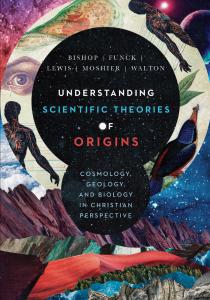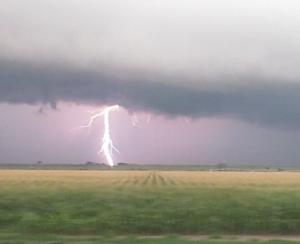 Chapter 2 of Understanding Scientific Theories of Origins turn to theology and the doctrine of creation. (The first chapter by John Walton looked at the interpretation of Scripture, What is a Credible Interpretation?) Before even beginning to look at the science we need a foundation. Interpretation of Scripture is part of the foundation, but we need to go deeper. Robert Bishop starts chapter 2 making exactly this point, “we need a solid theological foundation to think Christianly and without fear of the sciences.” (p. 14) A solid theological doctrine of creation breaks free of the either-or dilemma that labels events as either supernatural or natural. “A comprehensive doctrine of creation shows that this either-or dilemma presents a false choice; a logical fallacy of reasoning.” (p. 14)
Chapter 2 of Understanding Scientific Theories of Origins turn to theology and the doctrine of creation. (The first chapter by John Walton looked at the interpretation of Scripture, What is a Credible Interpretation?) Before even beginning to look at the science we need a foundation. Interpretation of Scripture is part of the foundation, but we need to go deeper. Robert Bishop starts chapter 2 making exactly this point, “we need a solid theological foundation to think Christianly and without fear of the sciences.” (p. 14) A solid theological doctrine of creation breaks free of the either-or dilemma that labels events as either supernatural or natural. “A comprehensive doctrine of creation shows that this either-or dilemma presents a false choice; a logical fallacy of reasoning.” (p. 14)
All doctrines, including the doctrine of creation, are human attempts to understand God. This means that they are limited and that it is acceptable to continue tweaking them. We can rest on the foundation found in Scripture and developed in the church, but details are still being worked out – and this will continue until the age to come. Robert has some memorable lines: “when a Christian becomes dogmatic about their understanding of the doctrine of creation, they cease to be open to their own growth in understanding the doctrine.” (p. 15) and “As with all Christian doctrines, the doctrine of creation is dynamic and growing. Yet it is also a fallible and imperfect human response to divine revelation in Scripture, in the creation, and principally in the person and work of Jesus.” (p. 16)
What are some fundamentals of the Christian doctrine of creation?
 The creator is distinct from creation. The creator is not part of creation and creation is not part of the creator. Because creation is distinct from and formed by the creator, it functions as it was intended to function. It is good in that it meets the creators intention. “God saw everything that he had made, and indeed, it was very good.” Gen 1:31
The creator is distinct from creation. The creator is not part of creation and creation is not part of the creator. Because creation is distinct from and formed by the creator, it functions as it was intended to function. It is good in that it meets the creators intention. “God saw everything that he had made, and indeed, it was very good.” Gen 1:31
Creation has functional integrity. Bishop calls this “one of the forgotten elements of the doctrine of creation.” (p. 18) The natural laws and regularities – including those with some element of chance or freedom – reflect a God of order rather than caprice. Science requires this foundation of regularity. We have to investigate nature to discover underlying order and regularity. For example …
The Bible describes pregnancy as God weaving a child in the womb (Ps 139:13) or as God the potter forming children (Job 10:8-9), but to understand how this weaving or forming takes place requires detailed scientific investigation of creations functional integrity intertwined with its relative freedom in biology, physiology, and so forth. (p. 19)
Creation is meant to be limited (and incomplete). God is working through finite and limited creatures to achieve his purposes. All of creation is still in a process of becoming. As we read in Genesis 1: Let the earth put forth vegetation … Let the waters bring forth swarms of living creatures … Let the earth bring forth living creatures of every kind … Be fruitful and multiply, and fill the earth and subdue it.
Indeed, to read Genesis 1 as an account of a completed work is to miss the eschatological thrust of creation – that creation is always going somewhere from “the beginning.” (p. 21)
God is sovereign over all. God rules over all “natural” processes. “In the ongoing completion of the creation we see divine acts of creation and providence intertwining under the triune Creator’s loving sovereignty.” (p. 21) Theologically speaking, the separation of natural and supernatural is misguided, although scientifically thinking it is a useful distinction.
 Creation was out of nothing … ex nihlio. This one does not come from Genesis, or necessarily from the Old Testament. But it is biblical and it developed over the first two centuries of the church. Bishop points to John 1:1-3, 1 Cor. 8:6, Col. 1:16, Heb. 11:3 (although there are alternate translations) and Rev. 4:11 as instrumental in the development of the doctrine of creation out of nothing.
Creation was out of nothing … ex nihlio. This one does not come from Genesis, or necessarily from the Old Testament. But it is biblical and it developed over the first two centuries of the church. Bishop points to John 1:1-3, 1 Cor. 8:6, Col. 1:16, Heb. 11:3 (although there are alternate translations) and Rev. 4:11 as instrumental in the development of the doctrine of creation out of nothing.
Creation ex nihilio is significant, despite its relative absence from the Old Testament. According to Bishop (p. 22), (1) “it is a direct expression of God’s sovereignty.”
(2) Creation ex nihilio necessitates that “creation was no accident on God’s part.” Creation is completely intentional and purposeful. It is “no temporary or trifling thing to God.“
(3) A creation out of nothing is vulnerable to return to nothingness.
Creation is contingent and finite, meaning that it cannot sustain itself in being. It requires God’s constant persevering care, or else it would fall back into nonexistence. Here there is a clear connection between God’s creating out of nothing and general providence sustaining the being and order of creation. (p. 22)
God is not merely the creator – who then lets creation run its course. Or a potter who sets it aside and moves on to a new project. He continually sustains creation, even through the so-called natural process we study as scientists.
Do these elements stretch your doctrine of creation?
Are there other elements add?
If you wish to contact me directly you may do so at rjs4mail[at]att.net.
If interested you can subscribe to a full text feed of my posts at Musings on Science and Theology.











